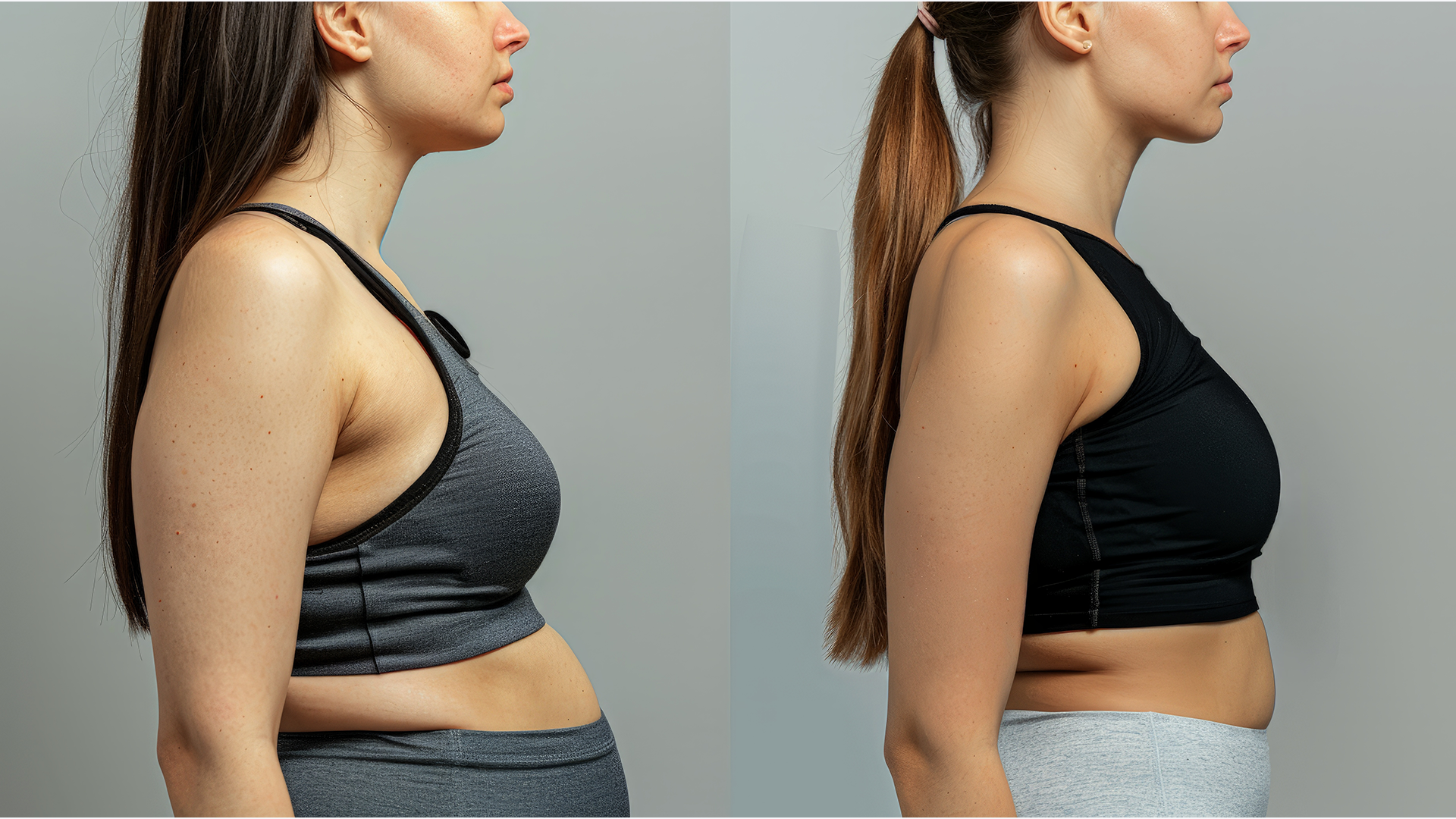|
Things you’ll learn in this blog… |
It’s that time of your life. Your periods are becoming few and far between; hot flushes are a daily staple - it’s time for menopause.
The very word can strike fear into the hearts of women - a totally under-discussed and seemingly taboo subject among many circles. But the reality is that menopause is a natural process that any menstruating person will go through at some point in their life.
However, it can be difficult, especially if you experience intense side effects. And it can affect many different aspects of your life - from mood swings to physical discomfort - but one of the most significant changes women struggle to deal with is how it affects their weight.
It's very easy for women to gain weight after menopause. This is because your body changes and reacts differently to certain foods and routines.
Even if you lived a very active lifestyle and were healthy before menopause, the changes can still be enough to cause unwanted weight gain. But that doesn’t mean you have just to sit back and accept it, and although it’s tough to lose weight post-menopause, it's not impossible.
With the right approach and understanding of what your body needs, you can shed those extra pounds and improve your health while boosting your confidence.
Here's some more information on menopause and some tips to help you reclaim your body.
What is menopause?
You probably know what it is, but let’s do a quick recap in case you aren’t sure.
|
Menopause is the point in a woman's life when they stop having periods; this happens due to a drop in the female sex hormone, estrogen, which decreases as you age. |
Once estrogen drops to a certain point, your menstrual cycle will pause - it’s a bit of a portmanteau.
Typically Menopause happens when women are between 45-55, although it can happen naturally at much earlier or later ages and will differ for everyone. Women can also experience menopause if they've had surgery to remove the ovaries (where estrogen is produced) or if they've had cancer treatments such as chemotherapy.
A woman is only considered to be menopausal if they've not had a period for over 12 months. If it's before this timeframe, you will likely undergo perimenopause (but you can still experience similar symptoms).
What are the symptoms of menopause?
Going through menopause is an incredibly personal journey for each woman, bringing unpredictable physical, emotional, and psychological changes.
That's why it pays to be informed during this period, understand what you can do to support your body through its transition into a new stage of life, and learn how to lose weight after menopause.
Every woman will experience menopause in a slightly different way. Although there are common symptoms and side effects, some will experience specific side effects more than others.
Many symptoms that most women feel during menopause or perimenopause include:
- Anxiety,
- Mood swings
- Brain fog
- Hot flushes
- Trouble sleeping
- Headaches
- Weight gain
- Irregular periods,
- Low libido

Menopause is not a sudden process; you'll likely experience things gradually. For example, you'll likely not experience an instant stoppage of your period. Instead, it will become more irregular until it eventually stops.
One of the most challenging things women going through menopause must overcome is that once you reach it, you will no longer be able to conceive a child.
The reason is that you're no longer ovulating, meaning that you're not producing any eggs which can be fertilized. This can be tough for women to accept, especially if they still aspire to have children.
Why does menopause impact weight gain?
So why does this change impact weight in women?
Menopause causes a lot of changes and symptoms for a woman to process. However, one standard change associated with menopause that tends to take people by surprise is unexplained weight gain.
There are several factors at play when it comes to menopausal weight gain.
For example, declining levels of certain hormones can result in a metabolic slowdown which leads to more fat being stored in the body.
Furthermore, your appetite can increase due to hormonal shifts during menopause, which tends to trigger cravings for unhealthy foods high in sugar and fat.
Learning healthy lifestyle habits is critical during this time, as proper diet and exercise can go a long way toward mitigating this condition for many women.
That said, it takes a lot of determination to instigate these lifestyle changes, especially as the cravings can be intense.
Understanding why menopause impacts weight gain is vital, as getting ahead of any potential issues now will help prepare you for a smoother transition through this chapter in life. Some other factors that influence weight gain in women post-menopause include:
1. Hormonal Changes
One of the primary reasons why menopause can lead to weight gain is because of hormonal changes. During menopause, levels of the hormone estrogen decline, which can impact a woman's metabolism and how her body stores fat.
Additionally, declining estrogen levels can also lead to an increase in appetite. This can cause you to eat more than you need to, with the extra calories further contributing to you packing on the pounds.
Related content: Hormonal weight gain: causes and what prevents it
2. Slower Metabolism
Another reason why menopause can cause weight gain is due to a slower metabolism.
As women age, their metabolism naturally slows down, making it tricky to lose or maintain a healthy weight. A slower metabolism can also cause fatigue, making regular exercise more challenging.
Having such a sudden shift in your metabolic speed can be tough to deal with, as it will force women to change their eating habits severely to combat this.
For example, a diet that allows you to maintain a consistent weight will no longer be effective as your body will have a tough time breaking down those meals as energy.
3. Poor Sleep Quality
Poor sleep quality is another common symptom of menopause that can contribute to weight gain.
During menopause, most women suffer from hot flashes and night sweats, which can disrupt their sleep.

A lack of proper sleep can lead to fatigue and increased appetite, making it more challenging to maintain a healthy weight.
Plus, sleep is vital for our muscles to recover and repair themselves. This means that even if you're working out to try and combat the weight gain from menopause, it may not be as effective if you're unable to get much shuteye.
Related content: Sleep hygiene: what is it and how to improve it
4. Stress
Stress is another factor that can contribute to weight gain during menopause.
The hormonal changes throughout menopause are stressful in and of themselves. Additionally, many women juggle work, family, and other responsibilities during this time, which can further stress their lives.
When stressed, the human metabolism slows down, meaning that we store even more calories as fat. Plus, stress can cause us to eat more and encourage us to choose less healthy options.
As well as that, high levels of stress can cause fatigue and higher blood pressure, making us more susceptible to illnesses.
5. Menopause medication
To help manage the symptoms of menopause, some women may choose to take medication. This medication can contain either synthetic or natural estrogen to replace the low levels in your body, which can help with hot flashes, mood swings, and vaginal discomfort.
The issue is that some medications can also contribute to weight gain, especially if these medications contain anti-depressants or beta blockers.
6. Body mass changes
As you experience menopause, you're more likely to notice weight gain in some regions of your body. In addition, you’ll have decreased muscle mass, making it even more difficult to keep weight off.
Plus, as the extra weight is concentrated in these areas, it can make you look larger. Due to the hormonal changes from menopause, you'll likely encounter the most weight gain around your hips and thighs.
Can you lose weight post-menopause?
Losing weight is a difficult task at any point in life. Post-menopause adds an extra layer of the challenge, and with how the body changes during and after menopause, it may seem like your efforts are futile.
However, there are measures you can take to start losing weight with success, even post-menopause.
Dietary changes are one way to get started, and you can also utilize exercise to help you lose weight. There is no reason why you can't lose weight after you've experienced menopause; it's just going to be more challenging and will require more dedication.

You also have to factor in that you'll be a bit older when you experience menopause. As you age, certain exercises may be challenging to perform. For example, running-based cardio may not be an option due to having weaker knees that could get injured. As much as we’d all love to think we’re just as fit as we were in our twenties, we probably aren’t.
One of the most effective approaches to losing weight after menopause is to tailor your exercise and routine to suit you while focusing on your diet.
Related content: How to lose weight after 40: tips for Women
How to lose weight after menopause
To help you lose weight after you've experienced menopause, here are a few steps that, if followed consistently, should mean that you'll see changes to your appearance and fitness levels, allowing you to live the life you wanted post-menopause.
1. Eat a healthy diet.
As women age and experience menopause, our metabolism slows down, and we tend to lose muscle mass. This can make it more challenging to lose weight and keep it off.
However, by eating a rounded diet rich in fruits, vegetables, protein, and whole grains, you can help to boost your metabolism and maintain a healthy weight.
Women should aim to eat around 2000 calories a day to maintain weight, so to encourage weight loss, you could also try to eat a good diet while having a calorie deficit.
Sticking to an intake of 1800 calories should help you lose a few pounds over a few weeks. You could also supplement your diet with weight loss pills to increase your weight loss potential.
2. Get regular exercise.
Exercise is essential for maintaining a healthy weight post-menopause.
Not only does it help to boost your metabolism, but it also helps to build muscle mass and reduce body fat. Try to complete at least half an hour of moderate-intensity exercise on at least four days of the week.
If you're fit enough, you could do some work at the gym, but if not, things like walking and hiking can be good exercise, in addition to less intense sports like golf or even bowling.
Related content: 5 ways to increase your daily step count (and why it’s important)
3. Avoid processed foods.
Processed foods are often high in calories and low in nutrients, which makes them a poor choice for those trying to lose weight post-menopause.
Instead, focus on consuming whole, unprocessed foods packed with nutrients that will help you feel full and satisfied. Not only will this help you lose weight, but you'll also feel better mentally.
4. Drink plenty of water.
Water is essential for good health at any age, but it's crucial for those trying to lose weight post-menopause. Drinking plenty of water can improve your metabolism and minimize hunger. You should aim for 8-10 glasses per day.

One helpful trick is to have a glass of water instead of food every time you're craving. Most of the time, the water will fill you up and satisfy your appetite.
Another benefit of drinking more water is that it will ensure you urinate regularly. This can be beneficial as UTIs are more common for women post-menopause.
5. Avoid sugary drinks
Sugary drinks like soda, juice and sports drinks are often high in calories and low in nutrients. Even zero-sugar options aren't good, as they can cause bloating.
If you're trying to lose weight post-menopause, it's best to avoid these types of drinks altogether or limit them to occasional treats.
6. Get enough sleep.
Sleep is vital for your continued health and well-being but can also impact weight loss.
When we don't receive enough sleep, our bodies produce more of the hormone ghrelin, which increases appetite.
Getting adequate sleep each night can help to control hunger levels and promote weight loss. If you exercise regularly, enjoying deep sleep can also help you repair your muscles.
Related content: Sleep hygiene: what is it and how to improve it
Live life to the fullest after menopause
Many women fear menopause because it signals the end of their child-bearing years, not to mention the host of side effects that can be tough to process.
Menopause does not have to be the full stop you may think it is, and although it does mean you will no longer be able to have children, you can still lead a fit and active life.
By following the steps in the article, you'll be able to lose the menopause weight and come out the other side looking even better than you did going into the menopause.
For extra support in losing weight, you can also turn to PhenQ weight loss pills that can enhance your weight loss capabilities effectively and safely.
These supplements can provide you with an enormous boost to your weight loss routine and make the process feel far easier




